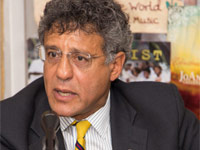Crooked Island, The Bahamas – Outcomes of local elections in the 32 districts throughout The Bahamas have Bahamians waiting to find out results of who will represent them for the next three years. Among the most active polls are districts in Mayaguana, Crooked Island, Exuma, Andros, and Grand Bahama, which could also determine voter momentum in the country.
“Every three years the Local Government Act of 1996 requires that local government elections are held. In the 32 districts throughout the Family Islands, persons would have nominated to become either members of councils, or township committees, so we have 133 positions available for which persons can serve their communities by way of local government,” said Byran Woodside, Minister of State for Lands and Local Government in the Office of the Prime Minister.
“By every indication, and it’s premature at this time, everything seems to have gone smoothly. Polls opened on time and the required presiding officers were in place, along with parliamentary commission agents, and agents for persons nominated for elections. I expect to visit at least five islands today and we’ve already covered two of them, Mayaguana and Crooked Island. We will go on to Exuma, Andros, and Grand Bahama.”
Voters were pleased to meet and greet Minister Woodside and election representatives seemed to feel comfortable that a Central Government presence was there to protect the integrity of democracy in the local elections.
“Local Government is essential to the development of the Family Islands because persons volunteer after having been elected to serve for three years to work in building their communities,” said Mr. Woodside.
“So in the Family Islands, local government is critical in providing leadership for decision-making. What local government does is put power or authority in the hands of the local people. So local government is government nearest to the people. They don’t have to wait for some bureaucrat in New Providence to make decisions for them.”
Local Government is responsible for the smooth operations and management of Family Islands, which includes making sure roads are patched, garbage is collected, additional security and maintenance staff at the schools and clinics.
“Local government officials can make those decisions, so it takes a lot of the red tape away that would be experienced, when back in the day, you had to rely on the ministry in New Providence to make that decision for you,” said Mr. Woodside.
Although local government creates an environment for Family Islands to operate independently, they must adhere to the budget provided for by central government.
“They are autonomous and the whole essence of local government is about autonomy. In as much as that, they have got their own elected officials, who make decisions for the local communities. Secondly, the central government provides them with their budgets. Now the budgets have to be approved and fit within the overall budget for the department,” said Mr. Woodside.
“What is critical for most people to understand is simply this. Every local government council has its own budget, so they get to determine how to spend their monies. That in itself provides them with the autonomy that they need. It’s really about the leadership that the local government practitioners bring to the table.”
The Local Government Act requires that each district submit a budget to the minister responsible. The minister, in turn, is required to visit the district, sit with the council, to discuss the budget, and essentially approve it to send it on. The recent global recession has put pressure on central government to reduce its expenditure on local government activities that are not immediate but can be planned to complete at a later date.
“As you can well appreciate, over the past three years, we have been faced with a global recession and so we’ve had our share of constraints,” said Mr. Woodside.
“A major constraint has been the fact that we have not been given capital expenditure for funding to local government for a number of years and so the central government has taken the role in spending monies for developing the islands for major road improvement, for dock and for administrative buildings and the list goes on.”
Local Government has a recurring expenditure budget where it can spend to maintain operations and pay the general expenses. This gives central government the option of using its capital to fund major projects in the Family Islands. Family Island budgets have not changed as reported in the 2011 Budget Communication.
“Our overall budget is pretty much the same in the districts and that is what you want to focus on, as it relates on the Local Government side,” said Mr. Woodside.
“Only one district got an increase and that was because they’ve got some challenges with respects to disposing garbage that used to be dealt with for them by the central government. But basically, we have held to the same budget amounts for each district as we have in the previous budget year.”
By Gena Gibbs
BAHAMAS INFORMATION SERVICES



